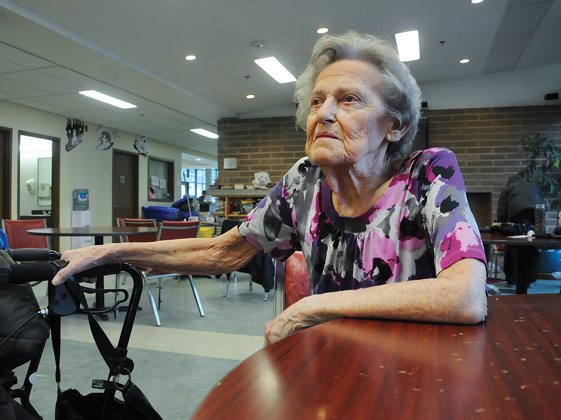An 82-year-old North Vancouver woman trying to recover from cancer surgery has been sent to a homeless shelter while her apartment undergoes repairs.
Fran Flann was still working part time at a drycleaners in Kitsilano to supplement her pension up until she collapsed from pneumonia on Jan. 1.
In the course of her chest X-rays, doctors found she had breast cancer, requiring a mastectomy. A week after the operation she was discharged only to find her apartment was inaccessible as the property managers were treating it for bedbugs. A Vancouver Coastal Health social worker arranged for her to stay at the Grouse Inn in Lower Capilano but funding for that lasted only a week.
“Our government has 60 – and I’m sympathetic to their situation – Syrian refugees at the Sandman Inn downtown. They’re in a hotel and they’re eating and you cannot help this lady who is recovering from major surgery to stay and rest? You want to send her to a shelter, predominantly for men, addicts, people with mental illness? You’ve got to be kidding me,” said Robyn Brown, a longtime friend of Flann’s who has been handling her shopping, cooking her meals and advocating for her with the province and social service agencies.
More than 11 days later, Flann remains at the shelter where she cannot get a good night’s sleep and deals with the odour of marijuana smoke wafting in her window and being locked out of her room from 9 a.m. till noon, all while trying to recuperate.
“The system has put her here, which is wrong,” Brown said. “It could be your mother, your grandmother that’s in this situation and ends up here.”
Asked how she’d be faring without Brown’s help, Flann welled up in tears.
“I’m ready to go into the middle of the road,” she said. “But you don’t want to give up.”
According to Vancouver Coastal Health, the one week at the motel was already outside the health authority’s specific jurisdiction.
“Once patients no longer require hospital care, we normally discharge them home. This woman no longer requires medical care, but because of her circumstances, staff went above and beyond and paid for her to live in a hotel for one week while her landlord cleaned her apartment. The landlord didn’t keep to that agreement, however, and now we’re told it would take two to three additional weeks before she can move back in,” said Tiffany Akins, Vancouver Coastal Health spokeswoman.
Flann will be welcomed back to her Lower Lonsdale apartment as soon as the extensive remediation work is finished, according to Judith Harris, manager with FirstService Residential.
“There was only one unit that was affected and we have been on it for the last three to four weeks. We’ve had two pest control companies. We’ve had heat treatments and sanitation spray done twice and we’ve removed all the carpeting and we’re putting in new flooring,” she said. “We’ve done everything we can. We’re very cognizant of her needs.”
Still, the flooring isn’t expected to be installed until next week, not soon enough for Flann who is increasingly desperate.
“She needs to get out of here. Now. Yesterday,” Brown said.
“I think, ideally, if she can’t go back home, let’s put her back at the motel – put her back there where she can lay in the bed, she can rest and watch television.”
“…And shower with nobody bothering me,” Flann added.
Sadly, cases like Flann’s are more common than we’d like to think, according Leya Iguchi, director of services with Hollyburn Family Services Society, a non-profit organization that gets by on grants and donations.
Hollyburn has outreach workers who deal directly with seniors in Flann’s situation but there is never enough housing space or funding to meet the dire need, Iguchi said.
“There are many seniors (at the shelter) at any given time and many of them have never been homeless before, have never been on the street before,” she said.
The municipalities have all “shown up with something” whether it be funding or units of affordable housing for seniors but the demand far outstrips what the local governments are capable of providing, Iguchi said.
Hollyburn is lobbying B.C. Housing to provide more, while the federal government does provide funding for those who are chronically homeless.
“Our biggest problem is these seniors who are homeless for the first time or for whatever reason have fallen through the cracks – and there’s many, and it’s a growing problem and it’s getting worse,” she said.
At the root of the problem is ever-climbing housing costs and a limited housing supply while incomes, especially for seniors on pensions, remain stagnant.
“I think it all ties into the other bigger scandal right now – the unaffordability,” Iguchi said. “How nobody local can buy anything and all the foreign investors are upping the price. It’s all tied into this.”
UPDATE: Flann moved back into a motel on Wednesday afternoon after a private citizen offered to pay for her stay. Vancouver Coastal Health says she will be able to move back to her apartment next week.
More to come.
Follow Brent Richter on twitter by clicking here



